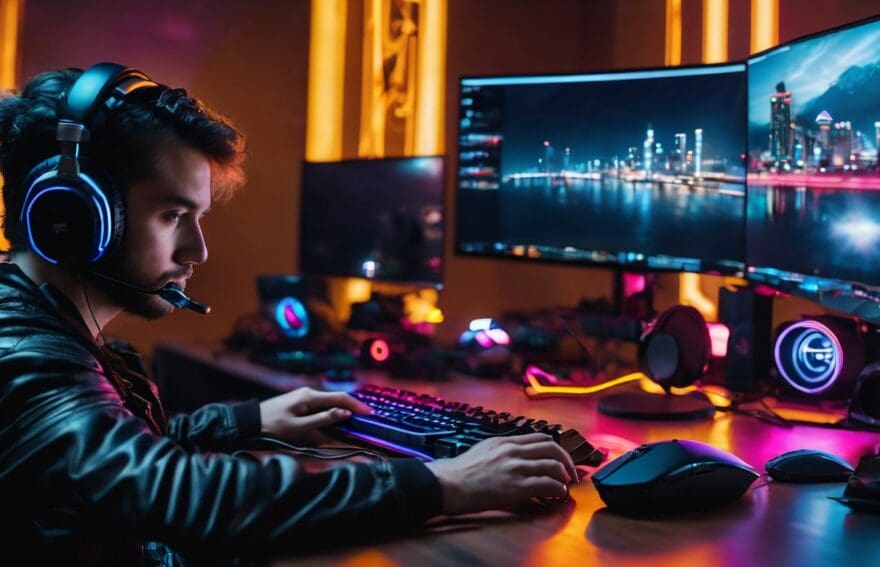The Psychology of Winning: Inside the Minds of Esports Champions

Updated On: October 30, 2025 by James Connolly
Winning in esports isn’t solely a matter of rapid reflexes and clever strategies. We’ve all grappled with the psychological aspects of competitive gaming, realising that even the most successful players invest as much energy into their mental game as they do perfecting their physical skills.
Our article delves into the often-overlooked elements necessary to cultivate a winner’s mindset—a fusion of unyielding mental strength and sharp tactical insight. Join us as we explore how you can harness your inner fortitude to triumphantly cross the finish line!
Understanding Esports Psychology
Esports, also known as electronic sports, is a form of competitive gaming that has rapidly gained popularity. The appeal of esports lies in the high level of skill and strategy required to compete at a professional level.
Definition of Esports
Esports, or electronic sports, are a form of competitive video gaming where players from around the globe compete in various game genres. These include real-time strategy games, first-person shooters, and multiplayer online battle arenas.
Teams or individuals play against each other in professional leagues and tournaments that often offer substantial cash prizes as well as international recognition.
Thought by some to be just a pastime, esports has grown into a billion-dollar industry with its own superstars and dedicated fan base. We see gamers turning their passion into careers by honing their skills, much like athletes in traditional sports.
The rise of live streaming platforms has helped catapult these virtual battles into the mainstream spotlight, bringing along new opportunities for player growth and audience engagement.
Appeal of Esports
Transitioning from understanding the definition of esports to exploring its appeal, it’s clear that competitive gaming has captivated a vast audience. The allure of esports lies in its ability to provide an immersive experience that combines skill, strategy, and entertainment in a virtual setting.
For passionate gamers and novice players alike, the appeal of esports stems from the opportunity to engage with like-minded individuals within a globally connected community. With high-stakes tournaments, thrilling gameplay dynamics, and the constant evolution of games creating an adrenaline-fuelled environment, many are drawn to the competitive nature and strategic depth that characterise professional gaming.
This unique blend of mental challenge and camaraderie fosters an environment where cognitive skills are put to the test while also offering a platform for personal growth and achievement.
The Role of Psychology in Esports
Understanding the importance of mental skills, processing speed, and focus in esports is essential for achieving peak performance. Managing emotions and fostering team unity are also key factors that contribute to success in competitive gaming.
Importance of Mental Skills
Developing mental skills is fundamental for success in esports. Professional gamers harness psychological resilience to stay focused, manage their emotions, and work effectively within a team.
Mental toughness enables them to overcome challenges and maintain a winning mentality. Through mindset coaching and performance psychology techniques, players build confidence, enhance their motivation, and sharpen their competitive edge.
The ability to foster strong mental skills is crucial for peak performance in the high-stakes world of competitive gaming.
Processing Speed and Focus
Professional gaming requires lightning-fast processing speed and unwavering focus. The ability to process information quickly allows players to make split-second decisions, giving them an edge over their opponents.
Maintaining intense focus throughout a game is crucial for staying attuned to the ever-changing dynamics of the virtual battlefield. Esports champions develop their mental resilience through rigorous training and strategic thinking, honing their skills to outpace and outmaneuver their competition.
By harnessing the power of mental focus, gamers can elevate their performance and achieve victory in high-stakes gaming tournaments.
Managing Emotions
Esports psychology emphasises the significance of managing emotions during gameplay. It involves understanding how to handle the adrenaline rush and pressure that comes with competitive gaming.
This includes techniques such as deep breathing, positive self-talk, and visualisation to stay calm under intense situations. Cultivating emotional intelligence helps players navigate through wins and losses while maintaining composure for a consistent performance.
Players can utilise mental skills training to regulate emotions and improve concentration, which is vital in high-stakes competitions. Implementing strategies like mindfulness meditation and goal-setting fosters a resilient mindset, reinforcing the ability to bounce back from setbacks effectively.
Team Unity
Transitioning from managing individual emotions to the collective mindset, team unity is an essential aspect of competitive gaming. As passionate gamers, we understand that effective communication and cohesive teamwork are crucial for success in esports.
The ability to strategise and coordinate moves effectively can make or break a team’s performance. Novice gamers should pay attention to this as it requires building trust and understanding among teammates.
The foundation of winning strategies lies in a champion mindset, encouraging motivation in gaming often driven by high-performance psychology. Confidence building through motivational coaching plays a significant role in creating a competitive mindset within teams.
Techniques for Mental Mastery
Discover the sport psychology techniques and importance of mental health in esports to enhance your gaming performance. Ready to unlock the secrets of winning? Keep reading!
Sport Psychology Techniques
Professional gamers utilise a range of sport psychology techniques to enhance their performance and maintain a winning mindset:
- Visualisation: Visualising success in gameplay scenarios can help improve focus, confidence, and overall performance.
- Mindfulness: Practising mindfulness techniques such as deep breathing and meditation can assist in managing stress and staying present during intense gaming situations.
- Goal-setting: Setting specific, measurable goals helps gamers stay motivated and focused on continuous improvement.
- Self-talk: Using positive self-talk reinforces confidence and helps shift the mindset from doubts to determination.
- Mental rehearsal: Rehearsing mental strategies for dealing with different in-game situations can aid in making quick, effective decisions under pressure.
- Stress management: Learning effective stress management techniques is crucial for maintaining composure during high-stakes competitions.
Importance of Mental Health
To excel in competitive gaming, mental health is crucial for sustained performance. It is imperative for gamers to prioritise their psychological well-being to maintain focus, composure, and confidence during high-pressure situations.
Just like physical health, mental wellness directly impacts gameplay and overall success in esports. Developing coping strategies, seeking professional support when needed, and taking regular breaks are essential steps towards nurturing a healthy mindset.
Proactively addressing mental health needs not only enhances individual performance but also fosters team dynamics, leading to better communication and collaboration within gaming communities.
The Mindset of Professional Gamers
Professional gamers face unique mental challenges, but with the right mindset and mental training, they are able to achieve high performance levels in esports. To learn more about the psychology of winning in esports, keep reading!
Mental Challenges in Esports
Mental challenges in esports demand peak performance, as competitive gaming requires intense focus, rapid decision-making, and emotional regulation. Professional gamers encounter immense pressure during tournaments, where the psychological strain can significantly impact their gameplay.
The high-stakes environment of esports can lead to stress and anxiety, affecting players’ mental state and overall performance. Moreover, managing tilt – a state of frustration or anger after a setback – is crucial for maintaining composure and making effective strategic decisions.
Harnessing the power of the mind is essential in overcoming mental hurdles in competitive gaming. Developing resilience against adversity empowers players to navigate through intense competitions with unwavering determination.
The Power of the Mind
Esports champions harness the power of their minds to achieve victory. Visualisation, mindfulness, goal-setting, and positive self-talk are key components used to cultivate a winning mindset in competitive gaming.
Professional gamers work with psychologists to develop mental skills and confidence needed for success, emphasising the importance of high-performance psychology in this growing field.
The psychology of esports plays a critical role in unlocking the mind game and breaking down barriers to success. The mind is the ultimate battleground where mental mastery can lead to enhanced gaming performance, making it essential for passionate and novice gamers alike to understand the significance of harnessing their own mental power.
Conclusion: The Importance of Esports Psychology for Winning.
In conclusion, understanding the psychology of winning in esports is crucial for players looking to achieve success at the highest level. Mental skills, focus, and emotional management are all integral components that can influence a player’s performance during competitive gaming.
The application of sport psychology techniques and mindfulness practices can play a significant role in developing a winning mindset among professional gamers. Ultimately, mastering the psychological aspect of esports is essential for those who aspire to become champions in this rapidly evolving industry.
FAQs
1. What does gaming psychology mean for esports champions?
Gaming psychology focuses on the mental strategies that help esports players enhance their performance and winning mindset.
2. How do esports champions use high-performance psychology?
Esports champions apply high-performance psychology by training their minds to stay focused, make quick decisions, and remain calm under pressure.
3. Can learning about the psychology of winning help casual gamers improve?
Yes, understanding the psychological techniques used by professional gamers can aid casual gamers in improving their own performance.
4. Are there specific mental practices that contribute to an esports champion’s success?
Indeed, many champs regularly practise visualization, goal-setting, and stress-reduction exercises to sharpen their competitive edge in tournaments.



